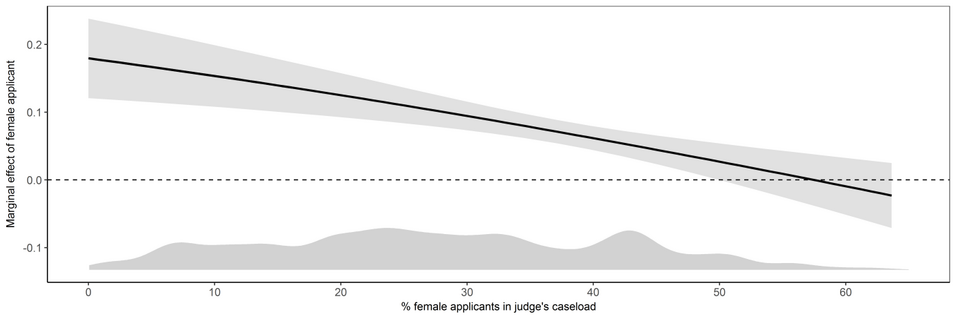Von Martin Haselmayer, Laurenz Ennser-Jedenastik und Alejandro Ecker
Geschlechterunterschiede nehmen einen zentralen Teil in Studien richterlicher Entscheidungen ein. Zahlreiche Untersuchungen konnten Unterschiede zwischen weiblichen und männlichen RichterInnen und Angeklagten feststellen. Unsere Analyse von knapp 41,000 Urteilen des Asylgerichtshofs in Österreich zwischen 2008 und 2013 prüft den Einfluss des Geschlechts von RichterInnen und AntragstellerInnen. Darüber hinaus testen wir, ob sich das Geschlechterverhältnis in der Fallzuteilung der RichterInnen auf deren Urteile hinsichtlich weiblicher und männlicher Asylsuchender auswirkt.
Wie wirkt sich das Geschlecht auf Entscheide des Asylgerichtshofs aus?
Die Geschlechterforschung im Bereich der Asyljudikatur postuliert, dass Frauen aufgrund persönlicher Diskriminierungserfahrung empathischer gegenüber Asylsuchenden sein sollten (u.a. Keith et al. 2013). Demnach sollten weibliche Richterinnen öfter im Sinne der AntragstellerInnen entscheiden als ihre männlichen Kollegen (H1).
Hinsichtlich des Geschlechts von Asylsuchenden zeigen wissenschaftliche Untersuchungen, dass weibliche Asylsuchende und Immigrantinnen generell positiver beurteilt werden, als männliche (Bansak et al. 2016). Darüber hinaus zeigen empirische Studien aus dem Bereich des Strafrechts, dass männliche Angeklagte höhere Strafen für vergleichbare Delikte erhalten und Berufungen seltener mit einer Herabsetzung des Strafrahmens einhergehen als bei weiblichen Angeklagten (u.a. Mustard 2001). Daher erwarten wir auch für den österreichischen Asylgerichtshof, dass Antragstellerinnen bessere Chancen auf eine positive Behandlung haben als Antragssteller (H2).
Bisher wurde nicht analysiert, wie sich das Geschlechterverhältnis in der Fallzuteilung der RichterInnen auf die Urteile niederschlägt: Da Geschlechtermerkmale vor allem dann sichtbar werden, wenn eine Gruppe unterrepräsentiert ist, erwarten wir, dass Unterschiede verstärkt auftreten, wenn RichterInnen hauptsächlich Fälle mit männlichen Antragstellern bearbeiten. Es wird also ein Interaktionseffekt zwischen dem Geschlecht der Asylsuchenden und dem Geschlechterverhältnis in der Fallzusammensetzung der RichterInnen erwartet. Geschlechterunterschiede (positiver Effekt für weibliche Asylsuchende) sollten also besonders oft auftreten, wenn RichterInnen nur selten mit weiblichen Antragstellenden konfrontiert sind (H3).
Der Asylgerichtshof als letzte Instanz von Asylverfahren in Österreich
Der Asylgerichtshof war zwischen 2008 und 2013 die letzte Instanz im regulären Asylverfahren in Österreich. Er entschied über Beschwerden gegen erstinstanzliche Bescheide des Bundesasylamts (erste Instanz) und über Beschwerden wegen Verletzung der Entscheidungspflicht.
Die Analyse von 40,980 Urteilen beruht auf den standardisierten Textdateien der Sprüche, die (anonymisiert) im Online-Rechtsinformationssystem (RIS) zugänglich sind.
Im Untersuchungszeitraum fielen rund 31 Prozent der Urteile des österreichischen Asylgerichtshofs positiv aus. 81 Richter – davon 39 Frauen – bearbeiteten durchschnittlich jeweils rund 90 Fälle pro Jahr. Das Geschlechterverhältnis bei den zu bearbeitenden Fällen war höchst unterschiedlich. Einzelne Richterinnen und Richter bearbeiteten ein Jahr lang keinen einzigen Antrag einer Frau, während andere zu fast zwei Dritteln mit weiblichen Antragstellern zu tun hatten. RichterInnen arbeiteten in geographisch strukturieren Kammern. Diese regionalen Unterschiede erklären auch die Unterschiede zwischen männlichen und weiblichen Asylsuchenden. Zwischen 2008 und 2013 bezogen sich insgesamt rund 28 Prozent der untersuchten Urteilssprüche auf Frauen.
Fallzuteilung und Forschungsdesign
Die Fallzuteilung erfolgt innerhalb der Kammern jeweils zu Jahresbeginn: Rechtssachen werden nach dem Nachnamen der antragstellenden Person und dem Jahr des Erstantrags auf Asyl vergeben. Zum Beispiel werden für Kammer A und Jahr Y alle BewerberInnen mit Nachnamen, die mit den Buchstaben A bis C beginnen, von RichterIn 1, D bis E von RichterIn 2 usw. entschieden. Darüber hinaus soll die Verteilung der Fälle eine ähnliche Arbeitsbelastung für alle RichterInnen sicherstellen. Wir gehen prinzipiell davon aus, dass die Initialen des Nachnamens nicht mit anderen Merkmalen der AntragstellerInnen korrelieren. Daher behandeln wir die Zuordnung von Fällen zu RichterInnen als ein geschichtetes (Quasi-) Zufallsverfahren, das vom Herkunftsland (das die Zuordnung zu einer Kammer bestimmt) der antragstellenden Person abhängig ist.
Die statistische Analyse beruht auf binären logistischen Regressionsmodellen, die für alternative Erklärungsfaktoren, wie regionale Unterschiede oder die Inanspruchnahme eines Rechtsbeistandes kontrollieren (s. Ecker et al. 2019 für Details und ausführliche Zusatzanalysen). Die abhängige Variable in diesen Modellen gibt an, ob eine Berufung gegen eine ablehnende Asylentscheidung des Bundesasylamts beim österreichischen Asylgerichtshof erfolgreich (kodiert 1) oder erfolglos (0) ist.
Ergebnisse: Geschlecht(erverhältnis) wirkt sich deutlich auf die Urteile aus
Die Ergebnisse zeigen, dass weibliche Asylsuchende höhere Chancen auf ein positives Urteil hatten, als männliche (H1). Bei vergleichbaren Fluchthintergründen erhöhte sich die Chance auf einen positiven Verfahrensausgang für Frauen um neun Prozentpunkte.
Darüber hinaus waren Richterinnen eher geneigt, Asyl zu gewähren, als ihre männlichen Kollegen (H2). Bei Richterinnen lag die Chance auf eine positive Entscheidung um rund neun Prozentpunkte höher – und zwar für Antragsteller beiderlei Geschlechts. Richter urteilten insgesamt etwas strenger, sind bezüglich des Geschlechts jedoch ebenfalls grundsätzlich neutral.
Unabhängig vom entscheidungserheblichen Sachverhalt zeigt sich, dass Richterinnen und Richter, die hauptsächlich Fälle männlicher Antragsteller bearbeiteten, eher zu Gunsten von Frauen entschieden (H3). Bei Richterinnen und Richtern mit einer annähernd paritätischen Verteilung weiblicher und männlicher AntragstellerInnen zeigten sich hingegen keine geschlechtsspezifischen Unterschiede.
Abbildung 1 zeigt, dass sich die Chancen weiblicher Antragstellerinnen um rund 17 Prozentpunkte erhöhten, wenn ein Richter oder eine Richterin vorwiegend mit männlichen AntragstellerInnen konfrontiert war. Bei Richterinnen und Richtern, die ein ausgeglichenes Geschlechterverhältnis bei ihren Fällen hatten, gab es dagegen keinen messbaren Vorteil für Frauen. Insgesamt liefern diese Ergebnisse deutliche empirische Belege dafür, dass sich das Geschlecht der AntragstellerInnen auf die Erfolgsaussichten im Asylverfahren auswirkt.
Diskussion
Die Ergebnisse dieser Studie betreffen grundlegende Fragen der demokratischen Rechtsstaatlichkeit und der Menschenrechte. Faire Gerichtsverfahren mit unabhängigen und unparteiischen RichterInnen sind für alle demokratischen Verfassungen von grundlegender Bedeutung und werden auch durch Artikel 6 der Europäischen Menschenrechtskonvention garantiert, die Teil der österreichischen Verfassung ist. Demzufolge verpflichten sich demokratische Länder, Rechtsinstitutionen zu schaffen, die faire Gerichtsverfahren gewährleisten. Dementsprechend sollten Fälle mit vergleichbaren entscheidungserheblichen Sachverhalten (wie Antragsteller aus demselben Herkunftsland) zu ähnlichen Urteilen führen.
Der Asylgerichtshof war zwischen 2008 und 2013 die letzte Instanz im regulären Asylverfahren in Österreich. Ablehnende Entscheide hatten in der Regel Ausweisungen und Abschiebungen in das Herkunftsland zur Folge. Nicht zuletzt aufgrund der Reichweite dieser Urteilssprüche ist es zentral, dass Anträge möglichst ausschließlich anhand sachlicher Kriterien entschieden werden.
Möglichkeiten, den beobachteten Geschlechtereffekten entgegenzuwirken wären geschlechterparitätisch besetze Gremien, oder ein möglichst ausgewogenes Geschlechterverhältnis in der Fallzuteilung.
Quellen
Bansak, K., Hainmueller, J., & Hangartner, D. (2016). How economic, humanitarian, and religious concerns shape European attitudes toward asylum seekers. Science, 354(6309), 217–222.
Ecker, A., Ennser-Jedenastik, L., & Haselmayer, M. (2019). Gender Bias in Asylum Adjudications: Evidence for Leniency toward Token Women. Sexy Roles, Online first. doi:10.1007/s11199-019-01030-2
Keith, L. C., Holmes, J. S., & Miller, B. P. (2013). Explaining the divergence in asylum grant rates among immigration judges: An attitudinal and cognitive approach. Law & Policy, 35(4), 261–289.
Mustard, D. B. (2001). Racial, ethnic, and gender disparities in sentencing: Evidence from the US federal courts. The Journal of Law and Economics, 44(1), 285–314.
Martin Haselmayer ist Universitätsassistent (post-doc) am Institut für Staatswissenschaft an der Universität Wien. Davor war er Mitarbeiter der Österreichischen Nationalen Wahlstudie (AUTNES) im Team 'Media-Side‘, sowie wissenschaftliche Hilfskraft und Projektmitarbeiter am Institut für Staatswissenschaft. Er hat das Studium der Politikwissenschaft und Romanistik in Wien, Aix-en-Provence und Lyon absolviert.
Laurenz Ennser-Jedenastik ist seit Oktober 2014 Universitätsassistent am Institut für Staatswissenschaft an der Universität Wien. Von September 2009 bis März 2013 war er wissenschaftlicher Mitarbeiter der Austrian National Election Study (AUTNES). 2013 und 2014 war er im Rahmen eines Erwin-Schrödinger-Stipendiums des FWF an der Universität Leiden (Niederlande) tätig.
Alejandro Ecker ist seit September 2016 Postdoctoral Research Fellow am Mannheimer Zentrum für Europäische Sozialforschung der Universität Mannheim. Davor war er wissenschaftlicher Mitarbeiter am Institut für Staatswissenschaft an der Universität Wien. Er hat das Studium der Politikwissenschaft und der Volkswirtschaftslehre an der Universität Mannheim und der Johns Hopkins University in Baltimore, Maryland, USA absolviert.



